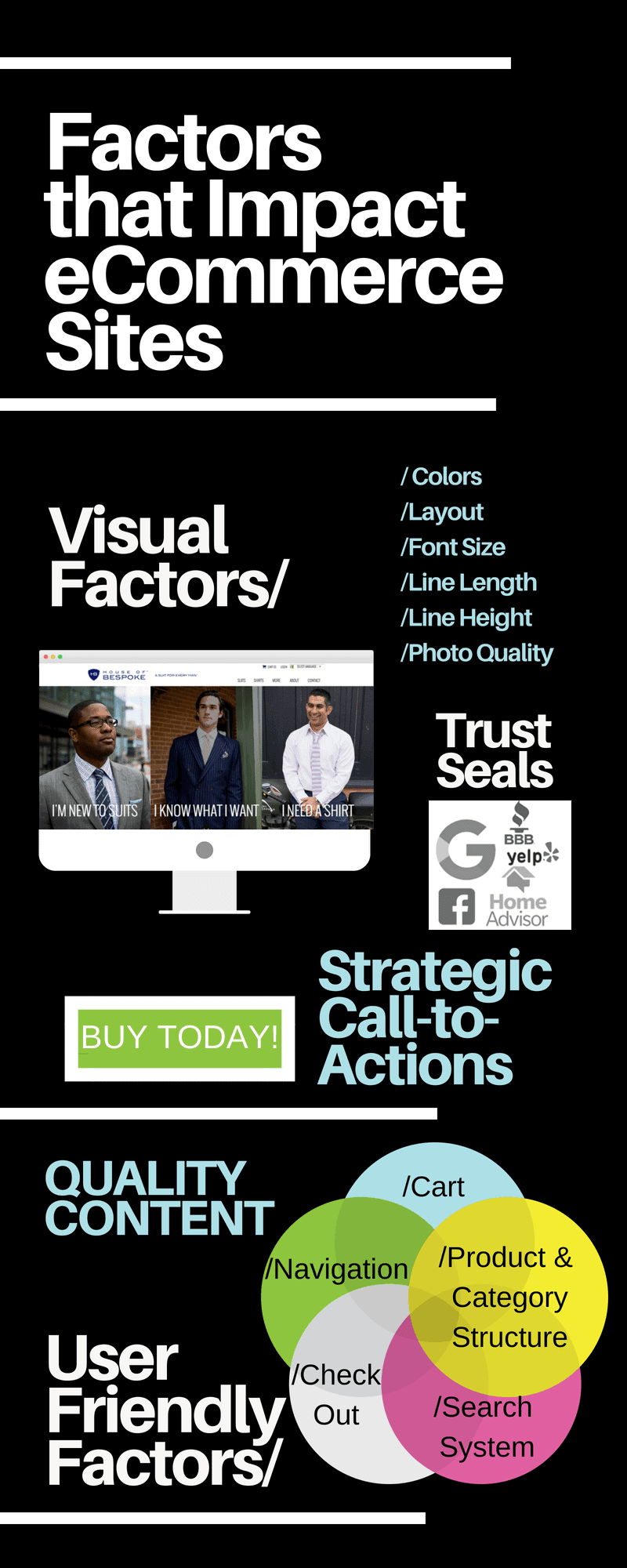Competent web developers know that while developing an e-commerce website can be a potentially daunting task, the website makes or breaks an e-commerce business. Consumers have virtually thousands of options for shopping, so a company cannot have glitches or distractions in their website that interrupt the consumer buying experience. With 15+ years of experience, the experts at Neon Rain have developed things to keep in mind when considering an e-commerce website. Our goal is to help you improve customer engagement and ultimately conversions. The following details should be considered when working with a developer to design your e-commerce website:
Proper product showcase and descriptions
Online shoppers cannot physically examine products as they would in a store, but they still have to "see" what they are purchasing to have confidence in the purchasing process. Products should be properly categorized and highlighted with high-quality images and thorough product descriptions. Details such as dimensions, instructions for use, size, weight, and color should be accurate and complete.
Shopping cart design
Adding an item to a shopping cart should be no more challenging than a simple click of a button. The cart page should include product and price summaries along with an easy-to-use option to continue shopping. The process of adding, revising, or removing options should be as straightforward as possible to prevent user frustration. The addition of links to return policies, shipping policies, and product warranty details help develop consumer trust.
User-friendly checkout and payment options
E-commerce companies cannot afford basket abandonment caused by a lengthy checkout process. A well-designed checkout page should be consolidated to one page with clear, concise checkout information. While many companies want their buyers to register as users, offering a guest checkout option tends to lead to higher conversion rates. Online shoppers use a variety of methods including PayPal, credit cards, debit cards, and gift cards. The more payment options offered, the higher the likelihood you have matched the consumer's preferences for payment and motivated the buyer to complete the transaction.
Mobile friendly
 A study conducted by the Pew Research Center found that 77% of Americans own a smartphone, and one-in-five American adults are "smartphone only" internet users. With that being the case, it is more than likely that consumers are making their online purchases on a mobile device. E-commerce companies must provide a shopping experience that works as flawlessly on a mobile device as it does on a desktop computer. It must be as inviting and user-friendly as the regular website while taking into consideration the constraints of mobile devices.
A study conducted by the Pew Research Center found that 77% of Americans own a smartphone, and one-in-five American adults are "smartphone only" internet users. With that being the case, it is more than likely that consumers are making their online purchases on a mobile device. E-commerce companies must provide a shopping experience that works as flawlessly on a mobile device as it does on a desktop computer. It must be as inviting and user-friendly as the regular website while taking into consideration the constraints of mobile devices.
Provide clear contact information and support
Consumers need to feel confident about the company they are buying from and that someone is always available to help them with their needs. If a user cannot readily identify company contact information, they will become suspicious of the site and go to a competitor. A privacy policy, return policy, telephone number, email address, and physical address should be easily located, and a chat option is always a confidence builder.
Design matters
The aesthetics of an eCommerce website matter. Themes should be consistent with products, and color schemes and text should be visually appealing. Call-to-action buttons must be highly visible and functional. Clear, user-friendly navigational tools should be simple and professional to avoid distracting the customer from reaching the desired goal of making a purchase.
 Factors that impact how an e-commerce site performs:
Factors that impact how an e-commerce site performs:
- Colors, layout, font size, line length, line height, photo quality, and workflow may seem like small details, but a good first impression keeps the consumer on the site.
- Quality content, trust seals such as those offered by BBB or SSL, review showcases, and social proof on products build customer trust and impact consumer confidence about purchases from the site.
- Strategic placement of calls-to-action and display of discounts or specials have a direct effect on conversions.
- A user-friendly navigational structure, product and category structure, and a robust search system allow consumers to find what they need easily and if these features are not high quality, visitors will go to another site.
Should you hire a professional or do-it-yourself?
CMSs (Content Management Systems) are full-blown platforms with a broad range of website-building tools and features that help web developers build beautiful and powerful websites. While CMSs offer limitless opportunities for developing an e-commerce website, there is a time-consuming and challenging learning curve in understanding the selected platform. For businesses with limitless resources, creating your website on your own may be feasible. For most businesses, using a skilled and talented professional developer is a better option. Partnering with an expert can help you avoid lost revenues due to glitches and delays in the web-building process.
Popular eCommerce Platforms:
- WordPress with the WooCommerce Plugin
- Magento
- Drupal with Drupal Commerce
- Shopify
- Volusion
- BigCommerce
- Custom designed for unique models
If you are ready to develop your e-commerce site, Neon Rain is a web development company that has an experienced team ready to safely walk you through developing a new customized eCommerce website.
